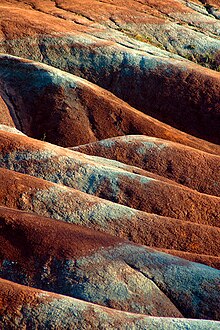Queenston Shale
| Queenston Formation Stratigraphic range: Maysvillian to Richmondian |
|
|---|---|

Queenston Formation exposed at the Cheltenham Badlands
|
|
| Type | Geological formation |
| Underlies | Cataract Group and Clinton Formation |
| Overlies | Cincinnati Group/Georgian Bay Formation / Carlsbad Formation / Oswego Formation |
| Thickness | Up to 300 m (980 ft) |
| Lithology | |
| Primary | Shale |
| Other | Siltstone, sandstone, limestone, gypsum |
| Location | |
| Region |
Southern Ontario Western New York |
| Country |
|
| Type section | |
| Named for | Queenston, Ontario |
| Named by | J. F. Caley |
| Year defined | 1940 |
The Queenston Formation is a geological formation of Upper Ordovician age (Maysvillian to Richmondian Stage), which outcrops in Ontario, Canada (along the northern and eastern flanks of the Niagara Escarpment, as well as east of Ottawa) and New York, United States (just south of Lake Ontario). A typical outcrop of the formation is exposed at Bronte Creek just south of the Queen Elizabeth Way. The formation is a part of the Queenston Delta clastic wedge, formed as an erosional response to the Taconic Orogeny. Lithologically, the formation is dominated by red and grey shales with thin siltstone, limestone and sandstone interlayers. As materials, comprising the clastic wedge, become coarser in close proximity to the Taconic source rocks, siltstone and sandstone layers are predominant in New York.
The formation is wedge-shaped, thick (up to 300 metres (980 ft) below Lake Erie), and laterally extensive, outcropping from Western New York to Cabot Head. It thins from southeast to northwest at around 0.6 metres per kilometre and has a dip of 3° to the south-southwest.
The formation is the topmost Ordovician layer in Southern Ontario and is unconformably overlain by the Lower Silurian rocks of the Cataract Group. At its base it has a conformable gradational contact with underlying beds of the Georgian Bay Formation in Southern Ontario, the Carlsbad Formation near Ottawa, and the Oswego Formation in New York.
...
Wikipedia
